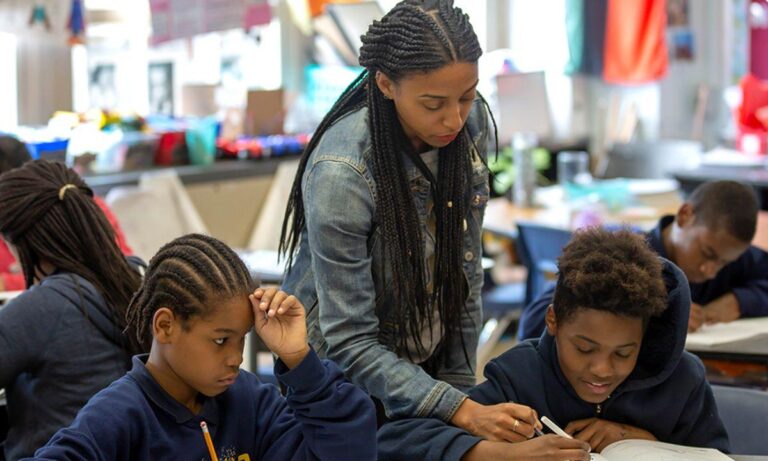Legal Challenges and Educational Equity: The Future of Chicago Public Schools’ Black Student Success Plan
Federal Legal Challenge Questions Race-Conscious Education Policies in Chicago
Chicago Public Schools’ recently introduced Black Student Success Plan, designed to enhance academic outcomes for Black students, is now facing a federal lawsuit that scrutinizes its policies and execution. Reported by WBEZ Chicago, this legal challenge raises pivotal concerns about whether the district’s race-focused strategies inadvertently breach equal protection laws by favoring one demographic group.This lawsuit intensifies the ongoing national debate over race-based initiatives in public education and underscores the complexities of implementing equity-driven reforms in one of the country’s largest urban school districts.
Examining the Contested Components of Chicago’s Equity Programs
The lawsuit specifically targets several key elements of Chicago Public Schools’ equity efforts,arguing that these measures may constitute preferential treatment and thus violate constitutional protections. The contested aspects include:
- Customized curricula developed to address the unique cultural and educational needs of Black students
- Resource distribution that channels additional funding to schools with predominantly Black student populations
- Recruitment and hiring practices aimed at increasing diversity among faculty and staff
| Program | Objective | Legal Concern |
|---|---|---|
| Black Student Success Plan | Raise graduation rates among Black students | Claims of preferential treatment |
| Cultural Competency Workshops | Increase teacher cultural awareness | Allegations of biased hiring practices |
| Targeted Funding Redistribution | Support under-resourced schools | Debate over equity versus equality |
Evaluating the Black Student Success Plan’s Effectiveness on Academic Performance
Since its inception, the Black Student Success Plan has aimed to narrow the achievement gap by providing tailored support to Black students. Preliminary results from the first year reveal promising trends, including increased graduation rates, improved attendance, and higher enrollment in Advanced Placement (AP) courses. Educators have noted that mentorship initiatives and culturally relevant teaching methods have fostered a stronger sense of belonging and engagement among students.
Key performance indicators from the initial rollout include:
| Indicator | Before Implementation | After One Year | Improvement |
|---|---|---|---|
| Graduation Rate (%) | 72 | 78 | +6 |
| Attendance Rate (%) | 85 | 89 | +4 |
| AP Enrollment (%) | 15 | 22 | +7 |
- Mentorship initiatives: Contribute to higher student retention and motivation.
- Culturally responsive pedagogy: Leads to increased classroom participation and fewer disciplinary incidents.
- Community partnerships: Enhance support networks through collaboration with local organizations.
Despite these encouraging outcomes, critics argue that focusing resources and programs on a specific racial group may marginalize other students and provoke legal challenges. The federal lawsuit underscores the delicate balance between targeted interventions and the principles of fairness and inclusivity in public education.
Legal Perspectives on Race-Conscious Educational Policies
Legal analysts are closely examining the constitutional ramifications of Chicago Public Schools’ race-focused strategies. The central question revolves around whether such policies comply with the Equal Protection Clause of the Fourteenth Amendment or if they constitute unlawful discrimination. While the goal of closing racial achievement gaps is broadly supported, the methods employed raise intricate legal debates.
Key legal considerations include:
- Constitutionality of race-based programs: Are these initiatives permissible under current legal standards?
- Influence of Supreme Court precedents: How do landmark rulings like Parents Involved in Community Schools v.Seattle affect this case?
- Practical effects on students and districts: What are the real-world consequences for educational equity and access?
| Legal Issue | Potential Outcome | Expert Insight |
|---|---|---|
| Race-Based Admissions | Possible policy reversal or modification | Controversial but often essential for diversity |
| Targeted Funding | Redistribution of resources may be challenged | Necessary to address systemic inequities |
| Equal Protection Clause | Heightened judicial scrutiny of race-conscious policies | Tension between legal standards and social goals |
Strategies to Enhance Inclusive Education Amid Legal Challenges
In light of mounting legal pressures, it is crucial for Chicago Public Schools and similar districts to adopt clear and inclusive approaches that clearly communicate the intent and benefits of equity programs. Engaging the community through open forums and sharing complete data on program outcomes can help build trust and dispel misunderstandings. Collaborations with legal experts and civil rights organizations are also vital to ensure that initiatives comply with evolving legal frameworks.
Key recommendations for strengthening these programs include:
- Ongoing evaluation: Conduct regular assessments to monitor progress in closing achievement gaps.
- Diverse curriculum design: Incorporate multiple cultural perspectives to enrich learning experiences for all students.
- Professional advancement: Provide educators with training in culturally responsive teaching techniques.
- Community and family engagement: Amplify voices of historically underrepresented groups to foster inclusive decision-making.
| Approach | Expected Benefit |
|---|---|
| Transparent Dialog | Builds community trust and reduces misconceptions |
| Data-Driven Accountability | Ensures programs are effective and equitable |
| Continuous Educator Training | Improves culturally responsive teaching practices |
Conclusion: Navigating the Intersection of Equity and Legal Boundaries
The unfolding federal lawsuit against Chicago Public Schools’ Black Student Success Plan spotlights the intricate challenges of implementing race-conscious educational reforms in today’s legal and social climate. The case’s outcome will not only influence Chicago’s strategies for addressing achievement disparities but may also set precedents affecting equity-focused policies nationwide. As educators, policymakers, and communities watch closely, the balance between fostering inclusion and adhering to constitutional mandates remains a critical and evolving conversation.





